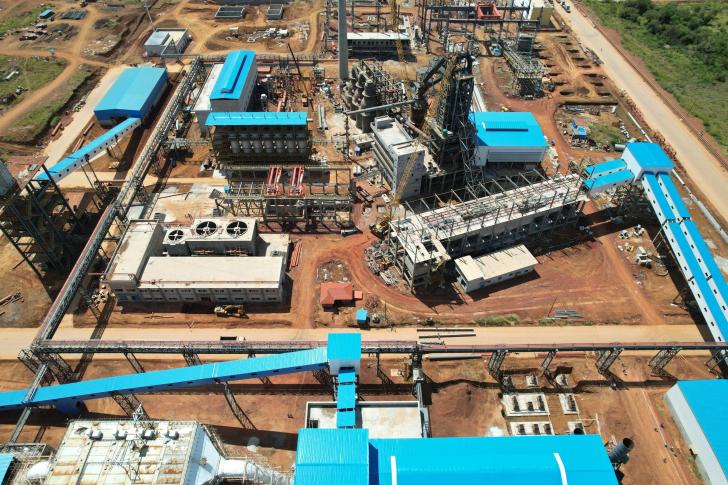News / National
The Chinese-owned Dinson invests over US$2 billion in Zimbabwe
15 Oct 2024 at 17:38hrs |
0 Views

The Chinese-owned Dinson Iron and Steel Company (Disco), the anchor industry for the Manhize Industrial Park near Mvuma in Zimbabwe's Midlands province, has invested more than US$2 billion in the country, aiming to unlock its economic potential. This was revealed by Dinson Group Project Director Wilfred Motsi during the Mine Entra 2024 event in Bulawayo last week, where he presented a paper on the economic potential of integrated steel sector beneficiation and value-addition.
Dinson, a subsidiary of Tsingshan Group—a Fortune Global 500 company and the world's largest producer of stainless steel—is spearheading efforts to develop Zimbabwe's steel industry. "Tsingshan Group controls the complete production chain, including nickel-chromium alloy smelting, battery material production, battery cell manufacturing, and supply of energy storage systems to global markets," Motsi stated.
Motsi highlighted that Dinson employs more than 185,000 people globally, and its operations in Zimbabwe are strategically located at the heart of southern Africa, benefiting from a highly skilled and trainable workforce. He added that Dinson's plant is expected to become the largest steel plant in Africa and will employ 95% Zimbabweans, with 90% of the workforce coming from local communities.
The first phase of the plant's operations will have an annual production capacity of around 600,000 tonnes, supplying a wide range of steel products, including rolled wire, R-bar coiled, hot-rolled round bars, and steel bars. Motsi noted that the company expects a significant customer base outside Zimbabwe and promises to deliver various steel standards and non-standard specifications at competitive prices, with a focus on reliable service.
Dinson is also laying the foundation for sustainable industrial growth, with electricity supply (captive power) in place, available water resources, and land. The company has begun constructing roads, with rail infrastructure in the planning stages, and is working towards obtaining Special Economic Zone Status to further enhance the ease of doing business.
In addition to job creation and industrial growth, Motsi explained that Dinson aims to increase revenue through higher-value exports, improve the country's trade balance, and contribute to import substitution to attract more foreign direct investment.
However, Motsi acknowledged several challenges facing the project, including the availability of quality raw materials, high energy costs, technological advancements, market fluctuations, and environmental regulations. Despite these hurdles, the company remains committed to driving industrial transformation in Zimbabwe.
The Dinson steel project marks a significant milestone in Zimbabwe's efforts to revive its steel industry and attract foreign investment, with the potential to become a key player in the African and global steel markets.
Dinson, a subsidiary of Tsingshan Group—a Fortune Global 500 company and the world's largest producer of stainless steel—is spearheading efforts to develop Zimbabwe's steel industry. "Tsingshan Group controls the complete production chain, including nickel-chromium alloy smelting, battery material production, battery cell manufacturing, and supply of energy storage systems to global markets," Motsi stated.
Motsi highlighted that Dinson employs more than 185,000 people globally, and its operations in Zimbabwe are strategically located at the heart of southern Africa, benefiting from a highly skilled and trainable workforce. He added that Dinson's plant is expected to become the largest steel plant in Africa and will employ 95% Zimbabweans, with 90% of the workforce coming from local communities.
The first phase of the plant's operations will have an annual production capacity of around 600,000 tonnes, supplying a wide range of steel products, including rolled wire, R-bar coiled, hot-rolled round bars, and steel bars. Motsi noted that the company expects a significant customer base outside Zimbabwe and promises to deliver various steel standards and non-standard specifications at competitive prices, with a focus on reliable service.
In addition to job creation and industrial growth, Motsi explained that Dinson aims to increase revenue through higher-value exports, improve the country's trade balance, and contribute to import substitution to attract more foreign direct investment.
However, Motsi acknowledged several challenges facing the project, including the availability of quality raw materials, high energy costs, technological advancements, market fluctuations, and environmental regulations. Despite these hurdles, the company remains committed to driving industrial transformation in Zimbabwe.
The Dinson steel project marks a significant milestone in Zimbabwe's efforts to revive its steel industry and attract foreign investment, with the potential to become a key player in the African and global steel markets.
Source - newsday
Join the discussion
Loading comments…





























